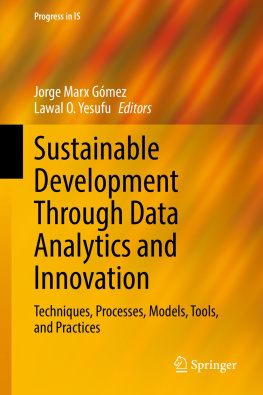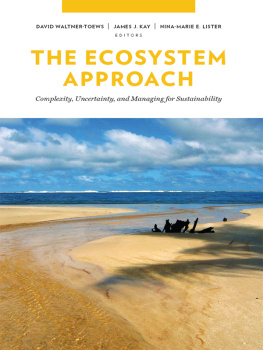Praise for this book
Burns and Worsley bring an acute understanding of the practitioner's art and science of development. Intangibles like participation, learning, and network development are at the core of ownership and appropriate action for social change for the poor. Navigating Complexity in International Development unlocks the analysis and dialogue needed to impact sustainable large-scale change. An important contribution for all of us working at the front end of development.
Steve Hollingworth, President and CEO, Freedom from Hunger
This book makes an important case for engaging complex systems, and contributes theory and practice for those researching and intervening to improve the conditions of the poor. It challenges current linear development thinking and offers new methods to effectively engage complexity. Its reflective case studies give rise to a new hope that, with the right approach, development can do better.
Frank Rijsberman, CEO, CGIAR consortium
The timely message of the book then is that we must adopt a collaborative systems orientation anchored in the realities of human participation when dealing with the complexity inherent in international change endeavours.
Hilary Bradbury, Professor, Division of Management, Oregon Health and Science University, and Editor, Action Research
This book presents powerful and persuasive case-based evidence to show how systemic change can be achieved at scale.
Robert Chambers, Research Associate and Professor Emeritus, Institute of Development Studies, University of Sussex
One of the most thoughtful explorations on the nature of complexity in the development sector. A rare example of a book where the writing is accessible without trivializing the underlying theory. It provides a great platform from which the participative action research and complexity theory communities can develop an exciting new body of both theory and practice.
Dave Snowden, Founder & Chief Scientific Officer, Cognitive Edge Pte Ltd
It is courageous to think in terms of complexity in an era where linear thinking and accountability set the tone. In my experience, working together, coping with power differences, energy, trial, error, reflection and learning, keeping an eye on the parts as well as the whole, using data as well as your senses are a few essential elements to make change processes developmental. The book is inspiring since it captures both practice and theoretical reflections.
Annemiek Jenniskens, ex-director, SNV/Netherlands Development Organisation
For too long, development problems have been articulated as technical issues reframed in ways that remove politics, power imbalances and economics from the analysis. In contrast, this valuable book draws upon original studies to demonstrate the case for taking account of complexity, emphasizing the importance of participatory action and reflection whilst recognizing the need to link bottom-up approaches with wider strategies for social change.
Marjorie Mayo, Emeritus Professor of Community Development, Goldsmith's College, University of London
A very readable and valuable contribution to the growing body of literature on change in complex situations, underscoring the futility of linear approaches based on the prediction of measurable results. With diverse examples of systemic action research, Burns and Worsley show how ownership, adoption and building relationships can lead to sustainability and scale with appropriate development interventions. Deserves to be read by practitioners and twice by development investors.
Richard Hawkins, International Centre for development oriented Research in Agriculture, Wageningen, the Netherlands
There are different ways to navigate complexity in development. One way is to attempt to model it quantitatively, in the hope that new and better analytical techniques can help resolve the tension between our current modus operandi steeped as it is in neo-Newtonian thinking and the challenges we increasingly face. Another way is to engage multiple stakeholders, and draw in different perspectives and mentalities, facilitating processes of social learning that can help better collective understanding and action. This book articulates how participatory methods can be used to effectively understand and engage with complexity. As such it provides an important bridge between these two approaches, and a vital step in showing how complexity thinking can be made practical and useful for those on the front line of development interventions, and most importantly for the communities they seek to support.
Ben Ramalingam, Leader, Digital & Technology Cluster, Institute of Development Studies, and author, Aid on the Edge of Chaos
Practical Action Publishing Ltd
The Schumacher Centre
Bourton on Dunsmore, Rugby,
Warwickshire CV23 9QZ, UK
www.practicalactionpublishing.org
Practical Action Publishing
The right of the authors to be identified as authors of the work has been asserted under sections 77 and 78 of the Copyright Designs and Patents Act 1988.
All rights reserved. No part of this publication may be reprinted or reproduced or utilized in any form or by any electronic, mechanical, or other means, now known or hereafter invented, including photocopying and recording, or in any information storage or retrieval system, without the written permission of the publishers.
Product or corporate names may be trademarks or registered trademarks, and are used only for identification and explanation without intent to infringe.
A catalogue record for this book is available from the British Library.
A catalogue record for this book has been requested from the Library of Congress.
ISBN 9781853398513 Hardback
ISBN 9781853398520 Paperback
ISBN 9781780448510 Library Ebook
ISBN 9781780448527 Ebook
Citation: Burns, D., and Worsley, S., (2015) Navigating Complexity in International Development, Rugby, UK: Practical Action Publishing,
Since 1974, Practical Action Publishing has published and disseminated books and information in support of international development work throughout the world. Practical Action Publishing is a trading name of Practical Action Publishing Ltd (Company Reg. No. 1159018), the wholly owned publishing company of Practical Action. Practical Action Publishing trades only in support of its parent charity objectives and any profits are covenanted back to Practical Action (Charity Reg. No. 247257, Group VAT Registration No. 880 9924 76).
The views and opinions in this publication are those of the author and do not represent those of Practical Action Publishing Ltd or its parent charity Practical Action. Reasonable efforts have been made to publish reliable data and information, but the authors and publisher cannot assume responsibility for the validity of all materials or for the consequences of their use.
Cover design by Andrew Corbett
Indexed by Elizabeth Ball
Typeset by vPrompt eServices, India
Printed by Hobbs the Printers Ltd., UK









